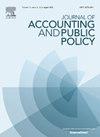How does auditor planning materiality affect audit pricing of fair values and external valuation?
IF 2.2
3区 管理学
Q1 BUSINESS, FINANCE
引用次数: 0
Abstract
In response to regulatory calls for research on materiality judgements and regulators discovering shortcomings in the audit of fair values, we provide the first empirical evidence on the impact of auditor planning materiality for fair value assets on the audit. Auditing standards require auditors to plan the audit considering the materiality of accounts based on both qualitative (i.e., nature of the account) and quantitative thresholds. The inherently risky, complex, and subjective nature of fair value assets render them a prime candidate to examine how auditor materiality judgments affect the audit. We also consider how external valuation of fair value assets affects the audit. We situate our study in the Australian real estate industry because fair value assets comprise the majority of assets in this industry. Using extensive hand-collected data spanning 2010 to 2020, our findings show that fair values below the quantitative materiality threshold of 10% are not related to audit fees. However, when fair value asset accounts are at least at the 10% threshold, they are positively associated with audit fees. In addition, we find that external valuation of fair value assets reduces the impact of material fair values on audit fees. Taken together, a primary implication of our results for regulators and policy makers, the audit profession, and literature is that auditors appear to be emphasizing quantitative materiality over qualitative materiality considerations even for accounts where qualitative considerations are warranted. Moreover, auditors also are relying on external valuations in their audit of material fair value assets, which raises implications for relying on the work of non-auditor specialists.
审计师计划的重要性如何影响公允价值和外部估值的审计定价?
为了响应监管机构对重要性判断的研究要求,以及监管机构发现公允价值审计中的缺陷,我们提供了第一个关于审计师规划公允价值资产重要性对审计影响的经验证据。审计标准要求审计员根据质量(即账户的性质)和数量门槛来规划审计工作,考虑到账户的重要性。公允价值资产固有的风险、复杂性和主观性使其成为检验审计师重要性判断如何影响审计的首选对象。我们还考虑公允价值资产的外部估值如何影响审计。我们将研究定位于澳大利亚房地产行业,因为公允价值资产占该行业资产的大部分。利用2010年至2020年期间大量手工收集的数据,我们的研究结果表明,公允价值低于10%的量化重要性阈值与审计费用无关。然而,当公允价值资产账户至少达到10%的门槛时,它们与审计费用呈正相关。此外,我们发现公允价值资产的外部估值降低了重大公允价值对审计费用的影响。综上所述,我们的结果对监管机构和政策制定者、审计行业和文献的主要含义是,审计师似乎更强调定量重要性而不是定性重要性,即使是在需要定性考虑的账户上。此外,审计师在对重大公允价值资产的审计中也依赖外部估值,这对依赖非审计专家的工作产生了影响。
本文章由计算机程序翻译,如有差异,请以英文原文为准。
求助全文
约1分钟内获得全文
求助全文
来源期刊

Journal of Accounting and Public Policy
Multiple-
CiteScore
4.80
自引率
2.80%
发文量
75
期刊介绍:
The Journal of Accounting and Public Policy publishes research papers focusing on the intersection between accounting and public policy. Preference is given to papers illuminating through theoretical or empirical analysis, the effects of accounting on public policy and vice-versa. Subjects treated in this journal include the interface of accounting with economics, political science, sociology, or law. The Journal includes a section entitled Accounting Letters. This section publishes short research articles that should not exceed approximately 3,000 words. The objective of this section is to facilitate the rapid dissemination of important accounting research. Accordingly, articles submitted to this section will be reviewed within fours weeks of receipt, revisions will be limited to one, and publication will occur within four months of acceptance.
 求助内容:
求助内容: 应助结果提醒方式:
应助结果提醒方式:


